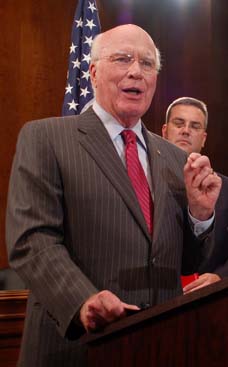
"Americans like the government-run programs of Medicare and Social Security. The federal employees' health care program and comparable state plans are well run. Why would a public option (without eliminating private insurers) not work as well as Medicare? And why do so many people resist legislation that will make private insurers charge less, cover more and cover pre-existing conditions? Projections are that by 2050, the 20 percent of GDP we will spend on health care will reach 47 percent. If we don't take control of our system, we will all go broke paying for health care. Furthermore, our health reform bill is based on the Swiss model, which relies mostly on regulating private insurers and provides a public option only as a safety net."
Senegal RPCV Art Buck writes: Costly, inefficient and often inhumane health care
Costly, inefficient and often inhumane health care
Text Size: A | A | A
Print this ArticlePrint this Article Email this ArticleEmail this Article
By Art Buck
Guest opinion
September 15, 2009
The United States is the only developed nation in the world without universal, affordable, government-subsidized health care. This failure is stripping tens of millions of Americans of their savings and their future. The U.S. system is costly, inefficient and often inhumane. U.S. health care costs 20 percent of gross domestic product (and we have the world's highest GDP), whereas the European systems average 10 percent of GDP.
Americans individually pay far more for health care than Europeans or Canadians. Insurance premiums have more than doubled in the last 10 years, even as wages remained essentially stagnant. Forty-seven million Americans (17 percent) have no health insurance. Even having insurance is no guarantee. According to an American Journal of Medicine report, 62 percent of the bankruptcies filed every year are caused by an unaffordable health event. An astonishing 78 percent of those bankruptcies are filed by people with health insurance that turns out to have insufficient coverage.
The causes of the problem are at least threefold. First, health care and insurance in the U.S. are "for-profit" enterprises. Insurance companies are large, publicly held corporations. Success is not measured by the delivery of affordable health care, but by profit which brings higher stock prices. The more money an insurance company takes in and the less it pays out, the more successful it is. Thus they refuse to insure people with pre-existing conditions, because people with health problems cost them money instead of making them money. Insurers make choices on what procedures they will cover, what percentage they will pay, and which providers you may visit. Many do not cover preventative care. Incidentally, health insurance companies have been spending more than $1 million each day to fight health care reform legislation. Most opponents of health care reform in Congress have received substantial contributions, even in the millions of dollars, from health care lobbyists.
Second, most Americans do not understand how well public health care runs in the rest of the developed world. Most Americans would say that the Canadian and European (each country has its own version) systems make people wait long periods and give poor care. However, if Americans traveled (or read) more, they would discover that Canadians and Europeans are, by and large, well satisfied with their health care. They get quality care, delivered virtually free, with citizens paying taxes or sliding-scale premiums to fund the system. Pre-existing conditions are covered. Even the impoverished Federated States of Micronesia has inexpensive universal government health care. Most Canadians and Europeans believe, correctly, that the American system is costly and nonsensical. Public health insurance in Europe works very well, while the American for-profit system favors insurers and costs too much.
Third, many Americans can be selfish and ill-informed. Many opposing reform anguish that they will pay taxes that go to help someone else. Too many of us do not believe that we have to look out for each other. But health needs and expenses touch every family. We are all in this together. Many Americans have a reflexive belief that private enterprise is better than government intervention. However, unchecked private enterprise brings low wages, lack of worker benefits, higher prices through monopolistic market share and disregard for the individual in favor of corporate profits. Ever feel helpless with airlines or oil companies? It is no different with health care, where insurers control the market.
Americans like the government-run programs of Medicare and Social Security. The federal employees' health care program and comparable state plans are well run. Why would a public option (without eliminating private insurers) not work as well as Medicare? And why do so many people resist legislation that will make private insurers charge less, cover more and cover pre-existing conditions? Projections are that by 2050, the 20 percent of GDP we will spend on health care will reach 47 percent. If we don't take control of our system, we will all go broke paying for health care. Furthermore, our health reform bill is based on the Swiss model, which relies mostly on regulating private insurers and provides a public option only as a safety net.
One last word, socialism. A bad word? Is robber baron better? Socialism, as that term is generally used in Western and Asian democracies today, means shaping government policy for the betterment of the average citizen. It does not mean totalitarianism, fascism, communism or Stalinism. Socialism means the government taking care of the individual where that person needs help, as with unemployment insurance, public education, public transportation, food safety regulation, social security, Medicare and health insurance for poor children. If people want to label health care reform "socialism," perhaps they should define the term and evaluate its effect before condemning it. Big business, in this case the health insurance industry, is a far greater threat to us than so-called big government.
Art Buck is an attorney emphasizing in trial law, who has worked as the Attorney General of Kosrae State, a state within the Federated States of Micronesia, and as a prosecutor for the Yugoslavia War Crimes Tribunal in The Hague, Netherlands. He has also worked overseas in Singapore, Cameroon and the U.K. for the U.S. State Department for five years and as a Peace Corps volunteer in Senegal. He has been insured under European state health care systems, U.S. federal health care, Micronesian health care and private U.S. health care.













